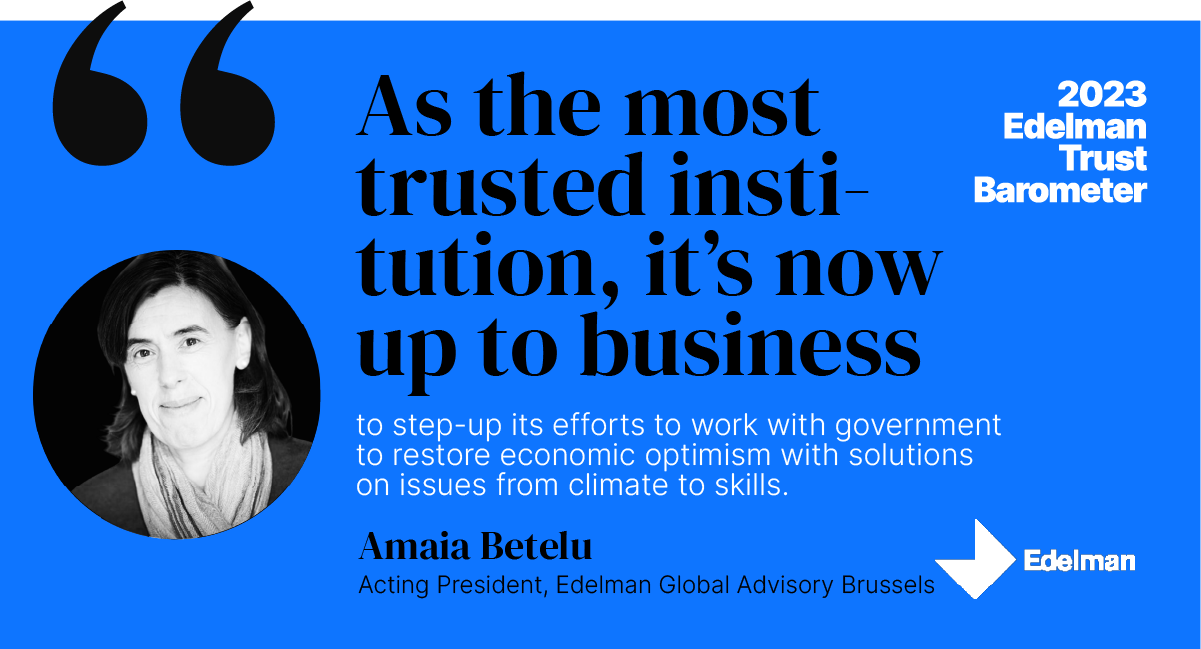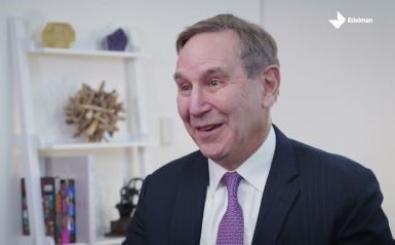The past few weeks have once again served as stark reminders of the importance of trust. The global banking system has been creaking under the weight of two banking collapses, first in the United States with Silicon Valley Bank (and several smaller institutions), and then here in Europe with Credit Suisse having to be rescued by its old rival UBS. If trust in Europe’s banking institutions erodes further, the situation could spiral out of control and put more banks at risk as investors and consumers alike might move their money to institutions or into assets deemed more trustworthy.
Just like a lack of trust in the banking system places other banks at risk, the same can be said of trust in any system. And an erosion of trust affects everyone. As with any system, maintaining high trust depends on strong institutional pillars – from businesses, NGOs, governments, and media. If even one of these core institutions falters, the entire system could unravel.
This underlying threat is reflected in our European trust data. Across the continent, citizens are increasingly divided over whether our current systems – whether they be political, economic, governance or otherwise – are fit for purpose. Without the safety net that a trusted system provides, people are beginning to fear for their economic future. Only 20% of respondents now expect that they and their families will be better off in five years, a 9-point decline from 2022. This is especially acute in Europe’s largest countries, with only 12% in France, 15% in Germany and 18% in Italy believing that their families will be better off five years from now.
We can see how this general distrust and pessimism leads directly to a more polarised society, where now very few would help (30%), live near (20%), or work (20%) with someone who disagreed with their point of view. Amongst European states, both Spain and Sweden are considered severely polarised, while France, the UK, Germany, Italy and the Netherlands are in danger of reaching severe levels of polarization. This trust divide is also driven by income levels; people who are among the top 25% of earners live in a different trust reality than those in the bottom quartile, with an 18-point gap in Germany and Ireland, and a 16-point gap in The Netherlands.
Normally it would be up to the media to pierce these differing trust realities, but the media no longer seems to be playing this role. In fact, many believe that journalists actively drive polarization. Where societies once lived in a shared media environment, they have now splintered into to live in echo chambers full of like-minded people, which makes it harder to solve problems collaboratively. This, in turn, is another reason why media – and especially social media – are not trusted anymore. In Europe, 45% of those polled now believe that media organisations are a key source of misleading information, just behind the government – which is seen by nearly half of all people (47%) to be spreading misleading information.
No wonder that trust in government continues to deteriorate. In democracies, extreme polarisation naturally undermines the ability to legislate, slowing the process of consensus-building and limiting a government’s ability to meet the expectations of its electorate. Pleasing one side of a polarized world only serves to anger the other side even more. This distrust of government is particularly acute in Spain and in the UK, where Brexit continues to divide and where political turmoil has become all too common. Today only 36% of Spaniards trust their government; in the United Kingdom, it is 37%. Across Europe, only 44% trust their government leaders to do what is right.

Business is now the sole institution seen as competent and ethical, and as a result, companies are expected to step into the void left by many governments. Yet when businesses do step in, most Europeans do not expect them to avoid politicisation – meaning that businesses risk becoming embroiled in difficult societal debates which could alienate and further divide major segments of the population. This has led to a leadership vacuum on many issues where neither businesses nor governments are willing nor able to step in.
The combination of economic anxieties, institutional imbalances, mass-class divisions and media-fuelled echo chambers makes people – especially Europeans – believe that their countries are now more divided today than in the past. The numbers are startling: In the Netherlands, 80% agree with that statement, followed by Sweden (73%), France (70%), Germany (66%) and the UK (65%). Amongst European countries polled, only Ireland was a minority (42%) convinced that their nation was more divided than before.
The polarization of society results in more than political antagonism. Across Europe, 71% now believe that the lack of civility and mutual respect today is the worst they have ever seen. 64% also say that the social fabric that once held their country together has grown too weak to serve as a foundation for unity and a common purpose.
In a time of poly-crisis, where multiple crises – war, pandemic, economic uncertainty and more – are stretching the very fabric of society, this is very concerning.
Having said that, the fundamental trust issues identified in the Edelman Trust Barometer can be overcome, provided institutions act quickly and effectively.
So what needs to be done?
- Collaborate with government. The best results come when business and government work together, not at a cross purpose.
- Build consensus and collaborate on policies and standards to deliver results that push us toward a more just, secure, and thriving society. Businesses must continue to step up. As the most trusted institution, business holds the mantle of greater expectation and responsibility. Businesses should therefore leverage comparative advantages to inform debates and deliver solutions across key issues, from climate to skills training.
- Restore economic optimism. A grim economic view is both a driver and outcome of polarization.
- Invest in fair compensation, training, and local communities to address the mass-class divide and the cycle of polarization.
- Advocate for the truth. Business also has an essential role to play in the information ecosystem. Be a source of reliable information, promote civil discourse, and hold false information sources accountable through corrective messaging, reinvestment, and other action.
All institutions – governments, media and NGOs need to raise their game, but it is business that has the biggest opportunity to heal the rift in European society.




